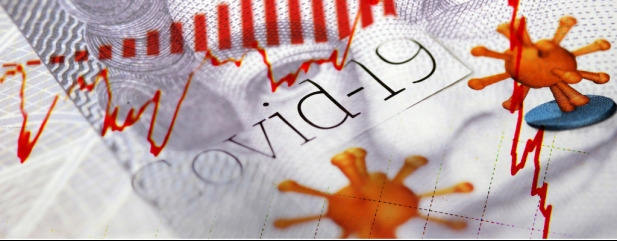Archived article
Please note that tax, investment, pension and ISA rules can change and the information and any views contained in this article may now be inaccurate.
Managing your finances in lockdown 2.0

The new lockdown restrictions unfortunately mean the UK economy is going to take a hit again. The Bank of England now expects GDP to fall 2% in the final quarter of this year, meaning that the economy would be 11% smaller at the end of 2020 than it was
at the beginning.
Beyond that, much is dependent on the course of the pandemic and the social restrictions that follow in its wake.
DON’T THROW IN THE TOWEL
At times like these it’s easy to throw the towel in when it comes to your finances because everything is so unpredictable. But while savers and investors can’t control the performance of the economy or the government response, there are concrete steps they can take to confront the challenging economic conditions we face.
The first thing to do is deal with any high cost debt, such as credit cards or loans. Paying down a credit card that charges 20% is equivalent to investing and getting a guaranteed 20% return on your money, so it’s an extremely effective way to improve your finances. If you’ve got lots of borrowing in different places, find the debt with the highest interest rate and start paying that off first, before moving to the next highest rate.
Also consider shifting your debt onto a cheaper rate if you can. Banks often offer low rates on balance transfers to encourage you to switch, sometimes reducing rates to 0%. While this is only temporary it does afford you some time to sort your finances without racking up large amounts of interest every month.
BUILD YOUR RAINY DAY FUND
After dealing with debts your next step should be to build up an emergency pot of cash that you can fall back on should you lose your job, your income is cut, or you face any unexpected costs. Typically a buffer of six months of salary is a reasonable amount, plus any big ticket expenses you know you’re going to have to shell out for in the foreseeable future.
Shop around for the best rate on your savings too. It’s not going to knock your socks off, but every little helps. Fixed term saving products might offer you a better rate if you’re able to lock your cash away for a specified period, typically six months, one year, three years or five years. You can mix and match between instant access accounts and fixed term savings to maximise your return but also making sure you’ve got enough liquidity.
Once you’re got enough cash to cover any emergencies, it’s time to think about investing for the longer term. While you can still use cash to do this, once inflation is factored in, your savings are likely to be losing their buying power. So an investment in the stock market is worth considering to harvest higher long term returns.
PREDICTABLE LONG-TERM RETURNS FROM MARKETS
The market is fickle in the short term, but is much more predictable in the long term. Despite the recent sharp falls in the UK stock market and the ongoing shadow cast by Brexit negotiations, it has still turned £100 into over £150 over the last 10 years.
Drip feeding money into the market using a regular monthly investment plan mitigates the risk of putting in a lump sum, only to watch a steep market fall right afterwards. By investing regularly you smooth out the volatility in the market, and also take the anguish and emotion out of deciding when to invest.
Think about your existing investments too. You shouldn’t tinker with your portfolio for the sake of it, but sometimes your portfolio can become skewed by market movements, so it pays to check in every now and then to make sure you’re not over-exposed to one area.
For instance a portfolio that was split 50% in US and 50% in UK stock markets 10 years ago would now be 72% invested in the US because the S&P 500 has significantly outperformed the FTSE-All Share.
The same thing can occur with individual funds and stocks that are heads and shoulders above the rest of the pack too. It’s clearly positive if they have achieved significant outperformance, but you still need to ensure that you aren’t too heavily reliant on the prospects of one company or fund manager.
USE TAX SHELTERS
Finally, a simple way to boost your returns is to reduce the tax you pay on profits. Investments held within a stocks and shares ISA are not liable to income tax or capital gains tax. On a £100,000 portfolio yielding 4% a year in dividends, that saves a basic rate taxpayer £150 a year, and a higher rate taxpayer £650 a year.
Investments held in a pension are also free from capital gains tax and income tax, and you get tax relief on your contributions too. You can withdraw your funds from the age of 55 (rising to 57 from 2028) and then 25% is tax free, though the remainder is taxable, depending on your income in retirement.
It’s never been more important to use tax shelters. At some point the chancellor is going to look at how to pay for the costs of the pandemic, and higher taxes on dividends and capital gains will be in the mix of levers he can pull to restore public finances. If he chooses to lean on those, tax shelters are going to be worth their weight in gold.
Important information:
These articles are provided by Shares magazine which is published by AJ Bell Media, a part of AJ Bell. Shares is not written by AJ Bell.
Shares is provided for your general information and use and is not a personal recommendation to invest. It is not intended to be relied upon by you in making or not making any investment decisions. The investments referred to in these articles will not be suitable for all investors. If in doubt please seek appropriate independent financial advice.
Investors acting on the information in these articles do so at their own risk and AJ Bell Media and its staff do not accept liability for losses suffered by investors as a result of their investment decisions.

 magazine
magazine








